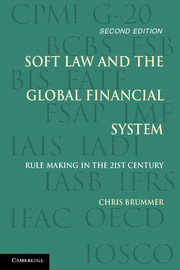Book contents
- Frontmatter
- Contents
- Preface to the New Edition
- Acknowledgments
- Key Abbreviations
- Introduction: The Perils of Global Finance
- 1 Territoriality and Financial Statecraft
- 2 The Architecture of International Financial Law
- 3 A Compliance-Based Theory of International Financial Law
- 4 How Legitimate is International Financial Law?
- 5 Soft Law and the Global Financial Crisis
- 6 Implementing the G-20 Agenda: A Transatlantic Case Survey
- 7 The Future of International Financial Law
- Index
Introduction: The Perils of Global Finance
Published online by Cambridge University Press: 05 November 2015
- Frontmatter
- Contents
- Preface to the New Edition
- Acknowledgments
- Key Abbreviations
- Introduction: The Perils of Global Finance
- 1 Territoriality and Financial Statecraft
- 2 The Architecture of International Financial Law
- 3 A Compliance-Based Theory of International Financial Law
- 4 How Legitimate is International Financial Law?
- 5 Soft Law and the Global Financial Crisis
- 6 Implementing the G-20 Agenda: A Transatlantic Case Survey
- 7 The Future of International Financial Law
- Index
Summary
International (global) financial law cannot be fully understood without first examining how financial regulation is administered at the domestic (national) level. This is not only because national governments and regulatory agencies are ultimately responsible for coordinating international policy and implementing it, a point that we explore in the following chapters. It is also because national regulatory authorities can, under the right circumstances, leverage their own capital markets and formal legal dictates in ways that export their own regulatory preferences, allowing them to become unilateral sources of international financial law. Their ability to do so informs as a result both how and when regulators coordinate policies with foreign counterparts.
Perhaps, then, it is not surprising that people are now more interested than ever before in the issue of international financial market regulation. Whether it be on the pages of the New York Times, the Frankfurter Allgemeine, or Le Monde, scarcely a week has gone by since 2007 without a front page story on the machinations of the “G-20,” “IOSCO,” the “Basel Committee,” or other seemingly arcane international institutions that are crafting key regulatory policies for the world's financial markets.
In some part, popular interest is due to the now widespread acknowledgment of financial regulation as a basic matter of economic prudence – and survival. Financial markets, when left to their own devices, have proven fertile grounds for disastrously bad behavior and poor decision making. Banks take on extreme leverage to fuel speculative and often foolhardy bets involving poorly understood investments; conflicts of interests can skew incentives such that analysts insufficiently assess and report risk; con men can develop fraudulent schemes to cheat investors out of their savings; and executives are empowered to act in their own short-term interest instead of the interests of the firms for which they work and shareholders. Ultimately, when gambles go awry, and animal spirits wane, financial institutions can fail – from commercial banks and investment banks to insurance conglomerates and money market funds – and in the process stifle lending and other financial activities necessary for running a modern economy. Indeed, the bankruptcy of just one institution can create panic in the marketplace, strangle the provision of credit in an entire financial system, and cause investors to pull hundreds of billions of dollars from an economy overnight.
- Type
- Chapter
- Information
- Soft Law and the Global Financial SystemRule Making in the 21st Century, pp. 1 - 22Publisher: Cambridge University PressPrint publication year: 2015



